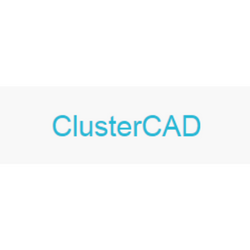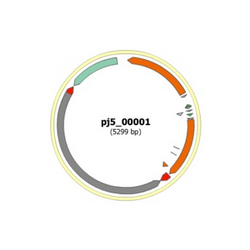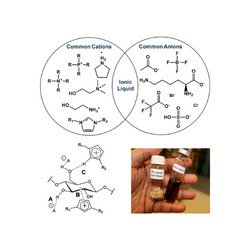
Automated Recommendation Tool (ART): A tool that leverages machine learning and probabilistic modeling techniques to guide synthetic biology in a systematic fashion, without the need for a full mechanistic understanding of the biological system.

ClusterCAD: A database and web-based toolkit designed to enable researchers to harness the potential of type I modular polyketide synthases for combinatorial biosynthesis. It provide tools to identify a truncated PKS as a starting point for domain exchange experiments given a small molecule target, and to select subunits as catalytic domain donors to alter a module’s acyltransferase, ketoreductase, or reductive cassette.

ICE: A cloud-based freely open-source repository with physical sample tracking capabilities that stores microbial strain, sequence, and plant seed information, including that associated with JBEI publications. Includes features such as DNA sequence editing and annotation, sequence validation results analysis, FASTA/GenBank/SBOL 2 support, and Web-of-Registries functionality.

VectorEditor: A cloud-based freely open-source visual DNA editing and annotation tool.

DIVA: DIVA (Design, Implementation, and Validation Automation) improves the operational efficiency of companies and research institutions by decoupling DNA design from fabrication. The web-based software platform enables users to collaboratively and visually design DNA constructs and submit the designs to internal resources or outside vendors for construction at scale. Users can then track the construction and subsequent sequence validation processes using DIVA.

Experiment Data Depot (EDD): A cloud-based freely open-source experiment data repository that stores proteomics, metabolomics, transcriptomics, flow cytometry, plate reader, and BioLector digital data, including that associated with JBEI publications.

Arrowland: A cloud-based interactive tool for visualizing functional genomics data (fluxomics, metabolomics, proteomics, transcriptomics).

MASCP Gator is a proteomics aggregation utility that queries and aggregates information from a variety of online Arabidopsis proteomic resources.

1001 Proteomes is a portal providing a simple way to browse changes to proteins caused by non-synonymous single nucleotide polymorphisms (nsSNPs) in accessions or natural strains of Arabidopsis thaliana.

Technoeconomic Model Wiki JBEI is developing technoeconomic models of various aspects of lignocellulosic biofuel production. The models can be used to estimate the impact of various market and technology developments on the economics of biofuel and enzyme production. The models and the assumptions used to construct them have been deposited on the wiki, which allows users to choose the parameter scenarios that are of most interest to them. Read more.

RiceNet is a probabilistic functional gene network for 41,203 non-TE related genes of Oryza sativa (by TIGR release 5), constructed using a modified Bayesian integration of many different data types from several different organisms, with each data type weighted according to how well it links genes that are known to function together in Oryza sativa.

Rice GT Database The Rice GT Database was created to integrate and host functional genomic information for all putative rice Glycosyltransferases (GTs), as a part of Joint BioEnergy Institute (JBEI).

Rice Glycosyl Hydrolase Database was created to integrate and host functional genomic information for all putative rice Glycoside hydrolases (GHs), as a part of Joint BioEnergy Institute (JBEI).

Rice Kinase Database The Rice Kinase Database was created to host functional genomic information gathered as part of an NSF funded rice kinase proteomics project and subsequently updated, expanded and maintained by JBEI.

Rice Oligonucleotide Array Database (ROAD) is a public resource for gene expression and coexpression analysis in rice, the most important staple food over the world. Over 1,000 microarray slides were incorporated and several kinds of analysis tools are available in ROAD.

JBEI GT Collection The JBEI GT Collection, the first glycosyltransferase clone collection specifically targeted for the study of plant cell wall biosynthesis, is expected to drive basic scientific understanding of GTs and better enable the manipulation of plant cell walls for the production of biofuels and other chemical products. The Arabidopsis clones are available from ABRC (abrc.osu.edu).
KitBase: KitBase contains detailed analysis of about 3000 mutant lines with mutations in ~40,000 genes. The resource was generated by fast-neutron-induced mutation in the model rice cultivar KitaakeX, and whole genome sequencing in collaboration with the Joint Genome Institute and Hudson Alpha.

MaxBin: a software package used for binning assembled metagenomic sequences, based on an Expectation-Maximization algorithm. MaxBin allows users to understand the underlying genomes of the microbes in their metagenomes by providing assembled metagenomic sequences and the reads coverage information or sequencing reads. MaxBin will report genome-related statistics, including the estimated completeness, GC content, and genome size. Users can then use MEGAN or similar software to find the taxonomy of each bin.

Targeted Proteomic toolkit for Escherichia coli proteins To expand the utility of quantitative proteomics for metabolic engineering, we validated and optimized targeted proteomics methods for over 400 proteins from more than 20 major pathways in E. coli metabolism (Batth TS, et al., 2014). Complementing these methods, we constructed a series of synthetic genes to produce concatenated peptides (QconCAT) for absolute quantification of the proteins and made them available through the Addgene plasmid repository.

